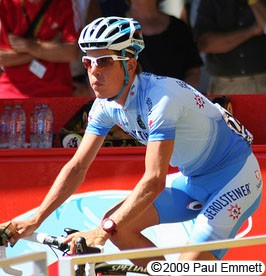 In an interview with French sports newspaper L’Equipe retired cyclist Bernhard Kohl gave a quick lesson on how to dope successfully within the pro peloton. Kohl was one of three riders found to have taken CERA, the latest form of EPO, in retroactive tests performed on his blood samples.
In an interview with French sports newspaper L’Equipe retired cyclist Bernhard Kohl gave a quick lesson on how to dope successfully within the pro peloton. Kohl was one of three riders found to have taken CERA, the latest form of EPO, in retroactive tests performed on his blood samples.
The Austrian pulled no punches in the interview, saying that he had retired last month ready to break the doping omertà he insists is still rampant in the sport. He believed that there were many more cyclists taking CERA in the 2008 Tour de France.
“What could the French authorities do, disqualify the whole classification of the Tour? I knew they could not do that. Strangely enough we were the only three from the race. (referring to himself Ricardo Ricco and Stephan Schumacher) It is my conviction that the entire top 10 could have tested positive,” Kohl told L’Equipe.
The cyclist said that he knew he was in trouble when the organization announced the retroactive testing for the samples taken in the Tour, but he knew there were many others and was hopeful that fact would help his situation. At the time it was believed in the doping underworld that CERA was completely untraceable.
Kohl explained how he and his manager Stefan Matschiner had worked out how to avoid getting caught with the help of the UCI’s biological passport results. Quick 20 minute sessions to transfuse a half liter of blood two days before a big stage kept them under the radar. Kohl wouldn’t be missed by the team, and the small amount would not set off alarms for the UCI’s anti-doping program.
Since the 27-year-old has officially ended his cycling career, he intends to work with the UCI and anti-doping authorities to detail how riders operate to avoid their controls.